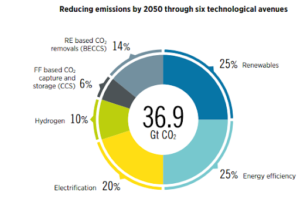In news- The International Renewable Energy Agency (IRENA) has launched the World Energy Transitions Outlook 2022 at the Berlin Energy Transition Dialogue recently.
Key highlights of the report-
- According to IRENA short-term interventions addressing the current energy crisis must be accompanied by a steadfast focus on mid- and long-term goals of the energy transition.
- High fossil fuel prices, energy security concerns and the urgency of climate change underscore the pressing need to move faster to a clean energy system.
- The Outlook sets out priority areas and actions based on available technologies that must be realized by 2030 to achieve net zero emissions by mid-century.
- It also takes stock of progress across all energy uses to date, clearly showing that the current pace and scale of the renewables-based transition is inadequate.
- It said that the energy transition is far from being on track and anything short of radical action in the coming years will diminish, even eliminate chances to meet our climate goals.
- It also said that investing in new fossil fuel infrastructure will only lock-in uneconomic practices, perpetuate existing risks and increase the threats of climate change.
- The Outlook sees investment needs of $5.7 trillion per year until 2030 including the imperative to redirect $0.7 trillion annually away from fossil fuels to avoid stranded assets.
- But investing in the transition will bring concrete socioeconomic and welfare benefits, adding 85 million jobs worldwide in renewables and other transition-related technologies between today and 2030.
- Renewables will have to scale-up massively across all sectors from 14 percent of total energy today to around 40 per cent in 2030.

- Global annual additions of renewable power will triple by 2030 as recommended by the Intergovernmental Panel on Climate Change.
- The Outlook sees electrification and efficiency as key drivers of the energy transition, enabled by renewables, hydrogen, and sustainable biomass.
- End-use decarbonisation will take centre-stage with many solutions available through electrification, green hydrogen, and the direct use of renewables.
- Notably electromobility is seen as a driver of energy transition progress, growing the sales of electric vehicles (EV) to a global EV fleet 20 times bigger than today.
- Increasing ambition in the National Determined Contributions and national energy plans under the Glasgow Climate Pact must provide certainty and guide investment strategies in line with 1.5°C.
- Particularly the world’s largest energy consumers and carbon emitters from the G20 and G7 must show leadership and need to support the global supply of 65 per cent renewables in power generation by 2030.
The International Renewable Energy Agency (IRENA)
- It is a global intergovernmental organization established in 2011 that is mandated to facilitate cooperation, advance knowledge, and promote the adoption and sustainable use of renewable energy.
- First international organization to focus exclusively on renewable energy, addressing needs in both industrialized and developing countries.
- Headquartered in Masdar City, Abu Dhabi.
- IRENA is an official United Nations observer.
- Membership : 160 countries and EU.
- The statute to gain IRENA membership requires that a state be a member of the United Nations and to regional intergovernmental economic-integration organizations.
- IRENA promotes the widespread adoption and sustainable use of all forms of renewable energy, including bioenergy, geothermal, hydropower, ocean, solar and wind energy, in the pursuit of sustainable development, energy access, energy security, and low-carbon economic growth and prosperity.














